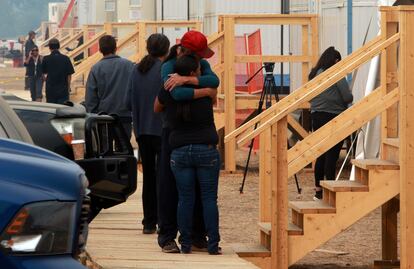Canadian officials have eased wildfire evacuation orders in a scenic British Columbia region
A weekend of cooler temperatures, favorable winds and some rain allowed fire teams outside the provincial capital of Yellowknife to shift their efforts to quelling the blaze

Canadian firefighters have begun easing evacuation orders in a scenic region of British Columbia, with the prospect of better weather raising hopes for the battle to contain wildfires, authorities said Tuesday.
To the north, in Northwest Territories, a weekend of cooler temperatures, favorable winds and some rain allowed fire teams outside the provincial capital of Yellowknife to shift their efforts to quelling the blaze after spending days just keeping it from advancing on the city.
Those are just two of the 386 wildfires that authorities said are currently burning in Canada, which has seen a record number of wildfires this year. The fires have chased tens of thousands of people from their homes and also sent smoke into parts of the U.S.
Officials in southern British Columbia were optimistic about the battle against wildfires that raged for days in the Okanagan Valley in threatening towns in the Kelowna area, a summer destination about 90 miles (150 kilometers) north of the U.S. border.
“I have to say that I really am beginning to feel that we are turning the corner here on this fire and a major measure of that is the rescinding of some evacuation orders,” West Kelowna Fire Chief Jason Brolund said. “I feel like we might be turning the corner a bit on the weather as well.”
Brolund estimated the fire destroyed fewer than 70 structures in West Kelowna and fewer than 20 on Westbank First Nation lands. To date there have been no reports of loss of life or missing people.
He said the mountains have been shrouded with smoke since the fire advanced last week, and the landscape is going to look different when the skies clear. “It might be pretty dramatic to start to see what we’ve lost out there,” he said.
A total of about 27,000 people in British Columbia have been under evacuation orders, with 35,000 more under alert to be ready to evacuate on short notice.
In the Okanagan Valley, evacuation orders were lifted in parts of Smith Creek, Tallus Ridge and Rose Valley. Bowinn Ma, British Columbia’s minister of emergency management and climate readiness, said evacuation orders had been downgraded to alerts in parts of West Kelowna, Westbank First Nation and Lake Country.
“We’re certainly not out of the woods, but I’m really heartened by what I saw on the ground,” British Columbia Premier David Eby said. He was speaking in West Kelowna after taking a helicopter tour.
He said it will be a long time for families who lost homes to recover.
“This is such an awful time for people,” Eby said.
British Columbia’s minister of emergency management said an order restricting travel to many communities in the province’s southern interior due to wildfires will be lifted at midnight. Bowinn Ma said non-essential travel to West Kelowna continues to be prohibited and people are being urged to stay away from the Lake Country and Shuswap areas.
In Yellowknife, officials said firefighters were shifting from defense to offense.
Until Monday, the teams had mostly focused on trying to stop the spread or reduce the intensity of the flames near Yellowknife. That meant building fire lines to rob the blaze of fuel or dropping water on it from the air.
Flames have been kept about 15 kilometers (9 miles) from Yellowknife, which was left virtually empty after nearly all 20,000 residents fled for safety last week.
Jennifer Young, information officer for the province’s emergency Management Organization, said at a Monday evening news conference that wildfires had caused a total of 25,900 people to leave their homes in the territory, about 60% of its population.
With Yellowknife a near ghost town, officials have warned city employees, first responders and volunteers who remained behind to be aware of wildlife displaced by the wildfires. In a message posted Sunday on Facebook, officials said bears and other animals had been reported roaming in the city.
The BC Wildfire Service said 100 firefighters from Mexico were expected to arrive in the province Tuesday and 200 from South Africa by the end of the week
In Northwest Territories, there have been efforts to transport evacuees’ pets to safety. On an emergency flight Monday, the California-based nonprofit group Wings of Rescue flew out 17 dogs, cats and other animals.
Sign up for our weekly newsletter to get more English-language news coverage from EL PAÍS USA Edition
Tu suscripción se está usando en otro dispositivo
¿Quieres añadir otro usuario a tu suscripción?
Si continúas leyendo en este dispositivo, no se podrá leer en el otro.
FlechaTu suscripción se está usando en otro dispositivo y solo puedes acceder a EL PAÍS desde un dispositivo a la vez.
Si quieres compartir tu cuenta, cambia tu suscripción a la modalidad Premium, así podrás añadir otro usuario. Cada uno accederá con su propia cuenta de email, lo que os permitirá personalizar vuestra experiencia en EL PAÍS.
¿Tienes una suscripción de empresa? Accede aquí para contratar más cuentas.
En el caso de no saber quién está usando tu cuenta, te recomendamos cambiar tu contraseña aquí.
Si decides continuar compartiendo tu cuenta, este mensaje se mostrará en tu dispositivo y en el de la otra persona que está usando tu cuenta de forma indefinida, afectando a tu experiencia de lectura. Puedes consultar aquí los términos y condiciones de la suscripción digital.








































